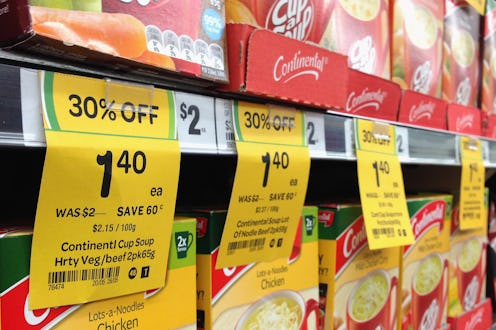The American food industry has undergone a serious transformation over the course of the past few generations, and the makeover hasn’t been very pretty. Food is made to be addictive now, encouraging us to eat more, regardless of the downsides. With food intolerances becoming surprisingly common and obesity an epidemic, it’s clear that something is wrong.
In Unprocessed: My City-Dwelling Year of Reclaiming Real Food , writer Megan Kimble sought to unravel the mess that our food system has become. In addition to learning how it evolved, she set out on a quest to discover just where exactly our food comes from, how it’s made, and how it affects us. But that wasn’t enough for her. On top of her research, she decided to abstain from processed foods for a whole year.
Kimble’s unprocessed adventure had her taking on new challenges, from carving up a cow carcass (talk about commitment) to learning to make her own chocolate (do try this at home). She quickly discovered that clean eating isn’t easy, but that it isn’t impossible, either. In Unprocessed, she shares research, experiences, and lessons that highlight why our eating and buying habits matter, along with providing tangible steps for those of us interested in adopting — or at least trying — a real-food lifestyle.
Based on Kimble’s experience, here are six benefits to cleaner eating:
It’s Better for the Local Economy
Processed foods make up a huge majority of products on the market — a market that is dominated by a small but powerful group of corporations. Because of this, moving away from processed food typically means moving away from supermarkets. In doing so, you’ll instead be spending more money at local businesses, which can have a major impact. At a talk by Kimber Lanning, director of Local First Arizona, Kimble learned a community the size of Tucson could create almost $140 million in new revenue for the city by shifting — not increasing — 10 percent of their spending to local businesses.
It Keeps American Farms in Business
“Farming is hard work, but increasingly, it is not work that pays,” says Kimble. She cites recent studies that have shown that American farms are on average operating at a loss, forcing more and more smaller-scale farmers and ranchers to sell their land. When this happens, demand doesn’t go away. Instead, we buy produce from overseas, where middlemen benefit far more than the people actually working the fields.
It Can Help Lower Your Carbon Footprint
Depending on how your eating habits change, you may be become a more eco-friendly consumer. Buying more local products means that your food requires less gas to get to you; purchasing bulk items create less waste than individually packaged processed goods; and eating less meat and/or dairy saves energy and resources. The planet will love you.
It Forces You to Get Creative In the Kitchen
There’s no sugarcoating it — no, seriously, sugar is processed, too — turning to unprocessed foods limits your options. After all, Kimble reveals that 70 percent of our food falls in the processed category. To avoid it, you’ll find yourself having to cook more and experimenting with new recipes. It might not always go well, but it'll be an adventure!
It’s Better for Your Body
Additives are rampant in American food. According to Kimble’s research, some 10,000 additives are available for our consumption, but most have never been formally reviewed by the FDA. How is that possible? Well, in 1958, the FDA came up with the Food Additive Amendment to the 1938 Federal Food, Drug, and Cosmetic Act. Though they defined additives as substances intentionally added to foods and made them subject to FDA approval, they threw in an exception: Anything “generally recognized as safe” (GRAS) was off the hook. Many additives are pretty horrifying, yet somehow, as Kimble puts it, “today, most food additives are innocent until proven guilty.”
It Makes a Statement
Ten companies control a quarter of the $1.25 trillion packaged and processed foods market. When you buy unprocessed foods, you keep money from them, making a statement about where your priorities are. As Kimble points out, our dollars matter. If American consumers spend less on processed food and more on unprocessed ones, corporations will take note and adjust their offerings accordingly. They might not prioritize your best interests, but they do listen to your dollars. You know the saying: Money talks.
